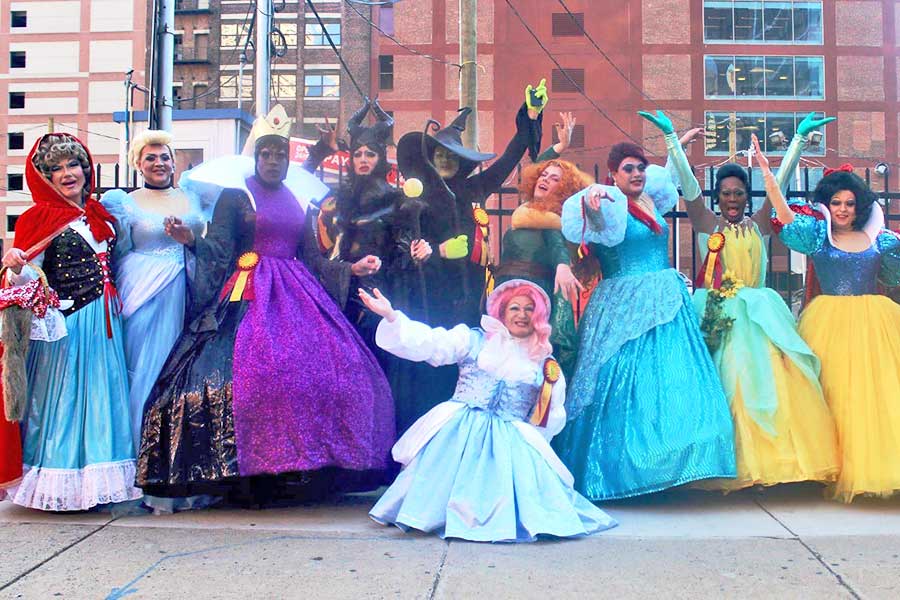Unlike last year’s Mummers Parade, there were no overtly anti-LGBT skits or incidents at the 2017 event.
Prior to this year’s big event, Mummers leadership underwent training from various departments in the city. The coordinators included the Philadelphia Commission on Human Relations, city Director of LGBT Affairs Nellie Fitzpatrick and Jen Childs of 1812 Productions. The city conducted these trainings in response to a skit mocking transgender reality-TV star Caitlyn Jenner’s transition, as well as other homophobic and racist skits and incidents, at last year’s event.
Rue Landau, executive director of PCHR, described Sunday’s parade as “more inclusive, more diverse, friendlier, happier and moving toward the best of the Mummers Parade that I hope we will soon achieve in Philadelphia.”
Landau acknowledged a few performers wore makeup and had signs that officials deemed offensive but once the division’s leadership was notified, they modified their costumes.
“In general, it was a far better parade than we’ve seen in years past with far fewer offensive acts or individuals,” Landau said.
PCHR trained the Mummers leadership and expected them to spread the message to their respective groups, Landau added.
“The division leadership stuck to their word and controlled and policed themselves so that if the division leadership was notified of a bad actor in their group, they quickly went to speak to that person and told them what they needed to change.”
Landau said she would like to see these trainings continue in the future.
“This is an ongoing process of learning about diversity and inclusion. It’s a lot of work to make sure that the Mummers Parade is inclusive of all aspects of Philadelphia but there’s a lot of work to be done,” Landau said. “Even a few offensive Mummers are enough to ruin the parade for everyone. And we need to get ourselves to a place where nobody marches down Broad Street offending anyone.”
Fitzpatrick said when it comes to last year’s performance, “no one can change the past, but they can certainly help change the future.” She said she was happy to see there were no performances insulting the LGBT community.
“That is not to say that the hurt that has happened in the past is now gone or completely forgiven, and I think that’s a really important point,” Fitzpatrick said. “Certainly, there’s continued work to do but I was really glad to see that there wasn’t hurtful, hateful performances geared toward LGBTQ people from what I saw and from what I’ve heard.”
Ian Morrison, who performs in drag as Brittany Lynn and helped form the Miss Fancy Brigade, said his group’s members saw support throughout the ranks of the Mummers.
“They really made it clear that there was going to be a lot of changes in the parade moving forward,” Morrison said. “It was all positive support coming from all of the different Mummers.”
Morrison said performers in the Comic Division were required to adhere to specific makeup instructions, which included not having more than 25 percent of black, brown or yellow makeup under any circumstances. At last year’s parade, performers in Sammar Strutters’ “Siesta Fiesta” donned brown face, sombreros, ponchos and taco costumes.
“The majority of the Mummers are there just to march and have fun and keep the tradition alive,” Morrison said. “[Not all of them supported] the racist things that happened last year.”
In a Jan. 3 statement, Anti-Defamation League Regional Director Nancy Baron-Baer called this year’s parade “an important step in the right direction,” saying it was “more inclusive and respectful.”
“The parade is a storied Philadelphia institution, which unfortunately has been tarnished in the past by a lack of diversity and by offensive portrayals based on race, ethnicity, sexual orientation or other traits,” Baron-Baer said. “The 2017 Mummers Parade … helped kick off the year on a positive note.”
Morrison mentioned some of the longtime Mummers have been involved since the 1950s and ’60s, when “what was OK then is not OK now.”
“I think a lot of these guys didn’t really have an idea that what they were doing was being seen as racist because it was just a different generation,” Morrison said. “But now with the sensitivity training, I think it’s being made aware to them. When they see all of the different inclusions of all of the different groups, [they see] it’s making the parade bigger and better. That’s what’s going to keep the parade going for future generations.”

